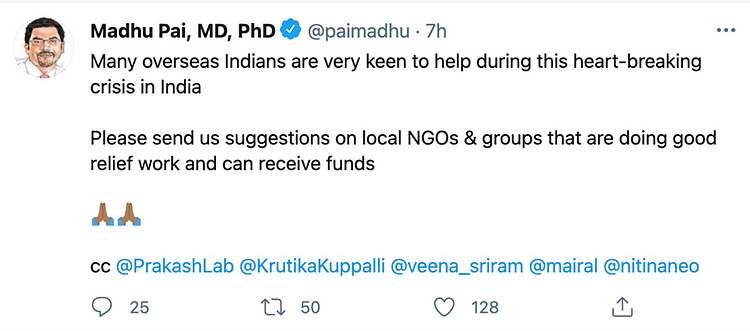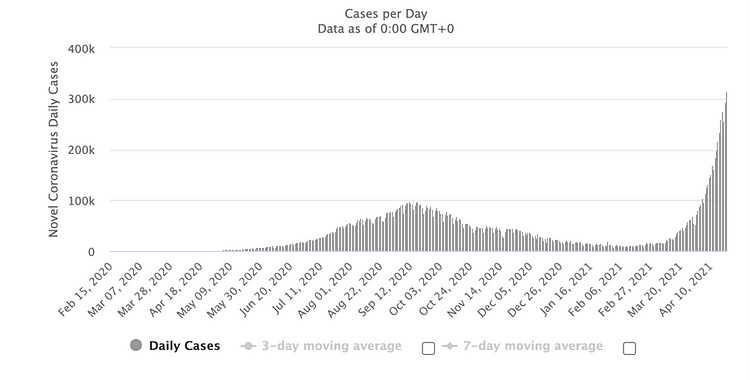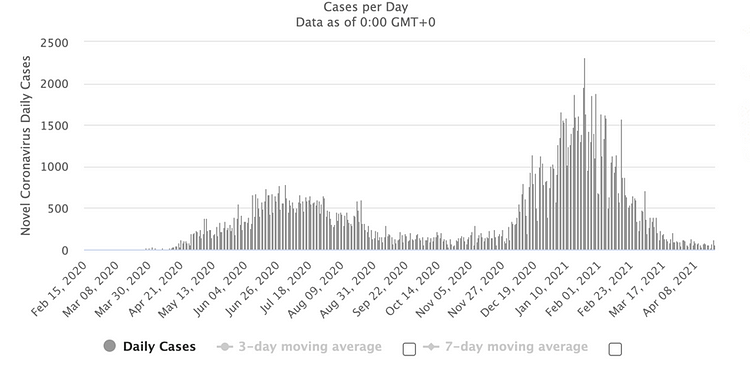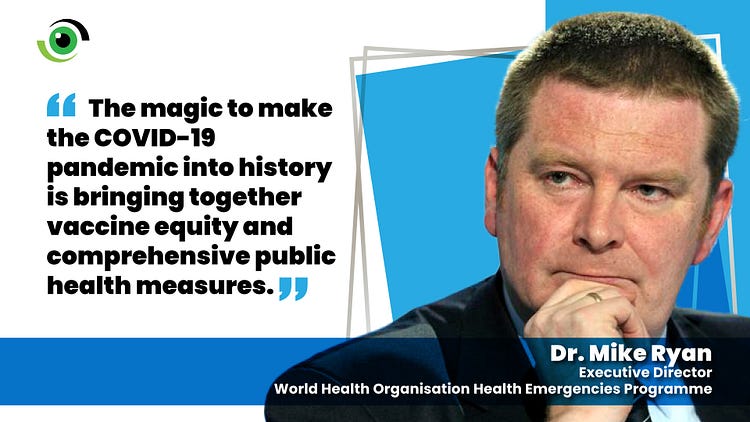In the last month, India has reported over 200,000 new cases of COVID-19 every single day. Hospitals are full and struggling to cope with the overwhelming demand for oxygen, crematoriums inundated, health workers are tired and families have been devastated. Many Indians in the diaspora feel helpless as they see family members struggling with the worst of the COVID-19 pandemic. On April 21, 2021, India announced 314,644 cases on a single day, the highest number of cases announced by any country on a single day since the onset of the outbreak.

India reported its first COVID-19 case on January 27, 2020 and like many other countries, it experienced a similar trajectory in new confirmed cases, with a steady increase in daily confirmed cases. This was to be expected, given that India is the second most populous country in the world with just over 1.3 billion people. In reality, cases relative to the country’s population were quite low. The first peak came in September 2020 with just over 90,000 new cases per day. From there, it seemed that cases were on the decline, plateauing at about 15,000 daily new cases in January 2021 when many other countries were experiencing an upsurge as the Christmas festive period brought families together. India seemed to be on track to fully restart its economy and return to life as many once knew it. It seemed that the country had escaped the worst of the COVID-19 pandemic. Plans were underway for what was described as the largest immunisation campaign in the world, and the country received global acclaim for the role it played in vaccine manufacturing.
Then the upsurge started. In the first week of March 2021, the average daily new cases were just over 16,700 and rising, and cases rose steadily to 56,200 in the last week of March 2021. In the week that just passed, India experienced an exponential rise in new daily cases, averaging at 249,000 per day. The reasons for the resurgence are complex, including the emergence of new variants, increased social activities and large gatherings and general complacency with public health measures.


India had responded to the COVID-19 outbreak with an initial national lockdown in March 2020. The national lockdown had been put in place at very short notice and saw the total ban on movement in the country for 21 days. Millions, especially migrant labourers, were left stranded in the densely populated cities as the public transport network was shut down. The lockdown was aimed at slowing down the transmission of COVID-19 and authorities wanted to protect the country’s health system from becoming overwhelmed. The sudden lockdown had its inherent challenges in a country as large and complex as India as some of the decisions in retrospect were not attuned to the local realities in the country.
Why should we be worried in Nigeria? We are in the same place India was in January 2021, since the onset of the pandemic. The number of daily cases reported by the Nigeria Centre for Disease Control (NCDC) in the last week of March 2021 averaged at about 130 nationwide, people have generally moved on from the prescribed public health measures, and the uptake of the vaccine has been sluggish, at best, even among healthcare workers. The general feeling is that we have dodged a bullet, and the pandemic is being referred to as something that happened in the past.

But now is not the time to be complacent. India has many similarities with Nigeria where millions cannot work from home, are employed in the informal economy, live off their daily earnings and live in densely populated cities where physical distancing is near to impossible. India also has a similar population age structure. Like Nigeria, their young population has remained active and very mobile. They are more likely to be asymptomatic transmitters, experiencing only a very mild illness when infected with the COVID-19 virus.
No one is safe till everyone is safe. Despite being one of the largest manufacturers of vaccines in the world, India is struggling to roll-out vaccines as quickly as is needed to stem the rise of infections. Given increasing local demand, India has held back on exporting supplies of vaccines produced by the Serum Institute of India and the government recently approved grants to boost supplies of vaccines from the same institute. Despite all these, the supply of vaccines remains challenged and unable to meet up with the surging demand. India needs far more vaccines than it currently has access to, and the vaccine constraints are making the control of the virus even more challenging.

So far, Nigeria has been supplied with only about 4 million doses of the Oxford/AstraZeneca COVID-19 vaccine through the COVAX facility and there is still no confirmed date when further vaccine supplies will be made available to the country. The current supply is enough to fully vaccinate only 2 million Nigerians, making a large part of the population still vulnerable to infection. The current situation in India should be a cautionary tale that must be heeded for Nigeria and other countries. The COVID-19 pandemic is not yet over. Nigerians have gone back to attending social gatherings where many of the necessary public health measures appear to have been cast aside, and there is limited mask wearing, physical distancing and hand washing, and the use of hand sanitizers.
We are all too aware of the limitations of our health systems and the need to protect health workers at the frontline. Most of our vulnerable population have not yet been vaccinated. Recent data from The Economist has shown that India is not likely to meet its vaccine target till late 2022, while in Nigeria the vaccine target will not be met till early 2023. Now really is not the time for anyone to let their guard down. While global solidarity in the fight against COVID-19 has not met expectations, we must all remember that infectious diseases have no regard for national borders.
The challenging situation in India must serve as a warning to Nigeria and all similar countries. This pandemic is far from over and right now, with the rising cases in India, the country needs all the help it can get.



This summarizes the growing concern we have in certain quarters. COVID-19 in Nigeria appears to be a thing of the past in the minds of a large number of the population. As I discuss with people, the smiles and sometimes laughter accompanying my caution are tinged with a sneer of pity or disbelief. There is no real enforcement of measures stipulated by the government when the 2020 lockdown was lifted and still no enforcement when those measures were tweaked and churned out once more. I have the sense that there is no active education and awareness going on nationally on this matter and what education and awareness that is going on is limited to what people glean from social media true and false and also the little in-country is not presented in the language that our people understand and appreciate which is music and dance and drama. This is the time for the Nigerian musicians and actors and actresses and creatives to come together to partner with government agencies and like-minded concerned groups in the private sector to wage war on this situation. Nigerian Health watch as always is on top of it but very much in the minority. All hands are needed on deck, now not tomorrow which may be too late. Nigerians are great believers in the luck of Nigeria and that there is a different God that loves Nigeria more than any other country in the world and orders our affairs, but we cannot afford to run out of that luck.
Hello Dr. Ilegbune,
What you have mentioned about the complacency in Nigeria is unfortunately a challenge. The country has gone back to business as usual and this is a real problem. Government institutions should be leading from the front, not relenting on public health messaging. Religious institutions, business should be enforcing the public health measures (masks at a minimum). What we have clearly seen is that new variants (as we are seeing in India) are leading to an upsurge in cases at a much faster rate (leading to more deaths). Less than 1% of our population has received the 1st dose of the COVID-19 vaccine. The pandemic is not yet over and now is really not the time to led our guard down.
Covid-19 is becoming very complex to handle. At some point, the cases will seem to be plummeting and all of a sudden, there will be a sudden spike.
Hello Ekene,
Thank you for your comment. The daily COVID-19 numbers reported in Nigeria are seemingly low. This false sense of security has led Nigerians to believe that COVID-19 is over. It only requires looking at daily numbers in India to really see that the pandemic is far from over.